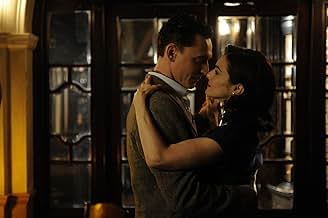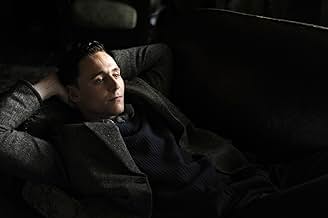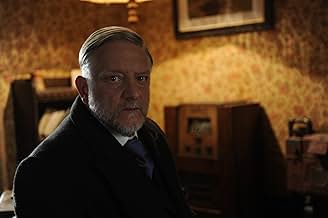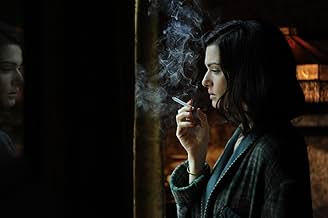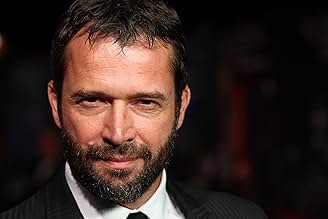The Deep Blue Sea
- 2011
- Tous publics
- 1h 38m
IMDb RATING
6.2/10
17K
YOUR RATING
The wife of a British Judge is caught in a self-destructive love affair with a Royal Air Force pilot.The wife of a British Judge is caught in a self-destructive love affair with a Royal Air Force pilot.The wife of a British Judge is caught in a self-destructive love affair with a Royal Air Force pilot.
- Director
- Writers
- Stars
- Awards
- 5 wins & 13 nominations total
Jorge Ojeda-Dávila
- Man in Bunker Bed
- (uncredited)
Owen Thomas
- Caretaker
- (uncredited)
- Director
- Writers
- All cast & crew
- Production, box office & more at IMDbPro
Featured reviews
This film is recommended.
Based on Terence Rattigan's 1952 play, The Deep Blue Sea is stylish soap opera at its best, and an overly ripe melodramatic downer at its worst. The film is reminiscent of the type of films that were popular fare in the fifties. ( And please, don't confuse it with the similarly titled shark attack movie some years back. ) No blood is spilled in this movie adaptation, but many lives are destroyed as loss and suffering does take its toll.
It is post-war Britain. Ruins are everywhere, from the bombed-out buildings to the people who inhabit them. There is a drabness in their hopeless lives, their colorless clothes, and their everyday routines. One such person is Hester Collyer, an unhappy romantic soul, trapped in a comfortable but loveless marriage to Sir William, a wealthy judge. Of course this means only one thing: suicide or an affair is in the offing. Fortunately ( or unfortunately, as the case may be ) after she meets a dashing but lonely RAF pilot named Freddie, there is a temporary respite from her real world. Lust, sin, and passion become the missing strands to her unraveling world ( which is not too surprising when one sees Hester's blatant scarlet red coat that overtly signals a Prynne moment is upon us. No subtlety lost here. Code Red, or is that Coat Read? )
This period melodrama is terribly British with a capital B. All proper diction, words unsaid, and formal reserve. Everyone is so noble and refined. Writer / director Terence Davies evokes the right atmospheric mood as we become lost in Hester's memories. He has a fine visual eye for those bittersweet times and Davies sensitively recalls the aftermath of WWII most efficiently with his use of popular and classical music and strong imagery, especially the impressive Underground bomb shelter scene. After an overly slow beginning, the director paces his film quite well using sounds, silences, and pauses in the characters' reactions to their conversations most effectively in telling his tale of a love undone.
The film sporadically uses these moments to tell the story of the makings of a passionate love affair, but its fragmented structure never allows us to understand Hester's attraction and her rationale to her self-proclaimed changes in her life. She's portrayed as a sympathetic victim, yet this character chooses the very unhappy lifestyle that she now wallows in, and we moviegoers are unable to see the results of her actions. It's as if some parts to her past are missing and sketchy, especially the happier times.
As the damaged Hester, Rachel Weisz is quite smashing. This talented actress fills her slightly underdeveloped role with such clarity and depth. ( Her scene in the pub as she stares into her lover's eyes while becoming uninvolved with the rowdy goings-on during the sing- along of a Jo Stafford tune says more than mere words could have expressed. ) It is a powerful nuanced performance. Completing the love triangle is Simon Russell Beale as her concerned husband and Tom Hiddleston as her cad of a lover. Both actors create indelible contrasting personalities, although the character of Freddie comes off the worst of the pair. Solid support from Ann Mitchell as Hester's landlady and Barbara Jefford is Hester's judgmental mother-in-law round out this wonderful ensemble.
The Deep Blue Sea is a successful throwback to the the great David Lean film, Brief Encounter. Only this time, the encounter is not brief and fleeting, just fleeting. It takes the moviegoer back to a former time, unlike today, when movies had a heart and mind, and dare I say, soul. GRADE: B
NOTE: Visit my movie blog for more reviews: www.dearmoviegoer.com
Based on Terence Rattigan's 1952 play, The Deep Blue Sea is stylish soap opera at its best, and an overly ripe melodramatic downer at its worst. The film is reminiscent of the type of films that were popular fare in the fifties. ( And please, don't confuse it with the similarly titled shark attack movie some years back. ) No blood is spilled in this movie adaptation, but many lives are destroyed as loss and suffering does take its toll.
It is post-war Britain. Ruins are everywhere, from the bombed-out buildings to the people who inhabit them. There is a drabness in their hopeless lives, their colorless clothes, and their everyday routines. One such person is Hester Collyer, an unhappy romantic soul, trapped in a comfortable but loveless marriage to Sir William, a wealthy judge. Of course this means only one thing: suicide or an affair is in the offing. Fortunately ( or unfortunately, as the case may be ) after she meets a dashing but lonely RAF pilot named Freddie, there is a temporary respite from her real world. Lust, sin, and passion become the missing strands to her unraveling world ( which is not too surprising when one sees Hester's blatant scarlet red coat that overtly signals a Prynne moment is upon us. No subtlety lost here. Code Red, or is that Coat Read? )
This period melodrama is terribly British with a capital B. All proper diction, words unsaid, and formal reserve. Everyone is so noble and refined. Writer / director Terence Davies evokes the right atmospheric mood as we become lost in Hester's memories. He has a fine visual eye for those bittersweet times and Davies sensitively recalls the aftermath of WWII most efficiently with his use of popular and classical music and strong imagery, especially the impressive Underground bomb shelter scene. After an overly slow beginning, the director paces his film quite well using sounds, silences, and pauses in the characters' reactions to their conversations most effectively in telling his tale of a love undone.
The film sporadically uses these moments to tell the story of the makings of a passionate love affair, but its fragmented structure never allows us to understand Hester's attraction and her rationale to her self-proclaimed changes in her life. She's portrayed as a sympathetic victim, yet this character chooses the very unhappy lifestyle that she now wallows in, and we moviegoers are unable to see the results of her actions. It's as if some parts to her past are missing and sketchy, especially the happier times.
As the damaged Hester, Rachel Weisz is quite smashing. This talented actress fills her slightly underdeveloped role with such clarity and depth. ( Her scene in the pub as she stares into her lover's eyes while becoming uninvolved with the rowdy goings-on during the sing- along of a Jo Stafford tune says more than mere words could have expressed. ) It is a powerful nuanced performance. Completing the love triangle is Simon Russell Beale as her concerned husband and Tom Hiddleston as her cad of a lover. Both actors create indelible contrasting personalities, although the character of Freddie comes off the worst of the pair. Solid support from Ann Mitchell as Hester's landlady and Barbara Jefford is Hester's judgmental mother-in-law round out this wonderful ensemble.
The Deep Blue Sea is a successful throwback to the the great David Lean film, Brief Encounter. Only this time, the encounter is not brief and fleeting, just fleeting. It takes the moviegoer back to a former time, unlike today, when movies had a heart and mind, and dare I say, soul. GRADE: B
NOTE: Visit my movie blog for more reviews: www.dearmoviegoer.com
Yes, the film is depressing. Yes, it is very long (or it feels rather longer than it is). But, it is good. After viewing it, I couldn't get it out of my mind. It's utterly haunting. There are many things that were less than great in this film. But I've narrowed it down to 1: The Pacing. If this one flaw were corrected, it would have made an excellent film. But, rather than focusing on the negative, I will write about the positive aspects of this particular movie. First, the cinematography is excellent. Those ultra-saturated colors serve the film and the period which it represents very well. I've covered the editing (in the negative) but I will say that there were some surprisingly beautiful camera movements in the piece, that were noticeable, yet served the mood of the story very well. However, if you ever see this film, I would recommend it for the wonderfully subtle performance of Rachel Weisz, who has grown into one of the best actors of her generation. Everything you need to know about the way her character is feeling is not always in the dialogue, but on her mesmerizing face. Weisz makes you not necessarily relate (it is, almost always un-relatable, because of the period and the character that she is playing), but she does make you care. There is no question that this is not a film for everyone. It is slow, it is internal, but it is also worth giving it a try. I moaned and complained all the way through, but in the end, I was unable to stop thinking about it. And, that alone is a testament to its power. It slowly gets under your skin, and you won't even notice it!
The Deep Blue Sea is a dramatic romance which takes place around the post-war (WWII) period where the young wife of a British judge starts having a love affair with a royal air force pilot. The confusion and complexity or their situation puts their love into some strong tests. Mostly for their own self-challenge. Rachel Weisz is mature and amazing as a leading actress, and then comes Tom Hiddleston who unveils a beautiful supporting performance and freshens up a little bit the foggy mood of the film.
Terence meets Terence and a wonderful theatrical film comes to life. T. Davies wrote the screenplay and also directed the movie based on a love story play by T. Rattigan. The cinematography is absolutely theatrical. Feels like a never-ending stage. Therefore, expect some -not very long- slow scenes accompanied with instrumental classic music. The story leads you to expect and understand the outcome as it is.
If you want to see a good drama, this romantic one may be it.
Terence meets Terence and a wonderful theatrical film comes to life. T. Davies wrote the screenplay and also directed the movie based on a love story play by T. Rattigan. The cinematography is absolutely theatrical. Feels like a never-ending stage. Therefore, expect some -not very long- slow scenes accompanied with instrumental classic music. The story leads you to expect and understand the outcome as it is.
If you want to see a good drama, this romantic one may be it.
I've been putting off review The Deep Blue Sea. Terrence Davies' remake of the 1950′s film based on the stage-play is a curious piece which I'm still struggling to get my head around.
It's a strangely polarising beast which split me between annoyance and er enjoyance
Here's the deal. On the one hand. It's a self-consciously old-fashioned portrayal of love and life in 1950′s London. Rachel Weiss plays Hester trapped in a flat and dull marriage she finds physical and emotional release in the arms of Freddie (played by Tom Hiddleston) a magnetic yet damaged WW2 pilot who is struggling to adjust to post-war life. The story is stylistic lavish with intimate set-pieces, evocative lighting and a mood of emotional frustration. What's not is as important as what is not said. There's evocations of Brief Encounter and Powell & Pressburger. An impressive meditation on love in all its forms and the damage it can cause.
On the other hand. It's an out-dated throw-back from a director who is stuck in time with a Britain that never really existed. Pampered hoity-toity, plummy-types (Hester? Freddie? Oh, 'k off!) moping and whining while the salt of the earth "Cor Blimey" types are just busy getting by. Posh types mope. Look out of windows. Smoke. Mope a bit more. Look out of more windows. Have a bit of a row. Cry. Look out of even more windows. Gah! Hester treats her husband like rubbish. Freddie treats Hester like rubbish. Hester treats herself like rubbish. It's so mannered and drenched in stylistic devices and cinematic tropes that they become at best distracting, at worst like a cinema school project with a budget.
So where does that leave us? Nostalgic meditation on love? Or stylised bore-fest of posh-types gagging for it? To be honest I'm still stuck between a rock and a hard place. Between, the devil and the . hmmm hang-on . it's suddenly occurred to me that maybe that's the point. Christ, I think I need to watch something stupid to clear my brain.
It's a strangely polarising beast which split me between annoyance and er enjoyance
Here's the deal. On the one hand. It's a self-consciously old-fashioned portrayal of love and life in 1950′s London. Rachel Weiss plays Hester trapped in a flat and dull marriage she finds physical and emotional release in the arms of Freddie (played by Tom Hiddleston) a magnetic yet damaged WW2 pilot who is struggling to adjust to post-war life. The story is stylistic lavish with intimate set-pieces, evocative lighting and a mood of emotional frustration. What's not is as important as what is not said. There's evocations of Brief Encounter and Powell & Pressburger. An impressive meditation on love in all its forms and the damage it can cause.
On the other hand. It's an out-dated throw-back from a director who is stuck in time with a Britain that never really existed. Pampered hoity-toity, plummy-types (Hester? Freddie? Oh, 'k off!) moping and whining while the salt of the earth "Cor Blimey" types are just busy getting by. Posh types mope. Look out of windows. Smoke. Mope a bit more. Look out of more windows. Have a bit of a row. Cry. Look out of even more windows. Gah! Hester treats her husband like rubbish. Freddie treats Hester like rubbish. Hester treats herself like rubbish. It's so mannered and drenched in stylistic devices and cinematic tropes that they become at best distracting, at worst like a cinema school project with a budget.
So where does that leave us? Nostalgic meditation on love? Or stylised bore-fest of posh-types gagging for it? To be honest I'm still stuck between a rock and a hard place. Between, the devil and the . hmmm hang-on . it's suddenly occurred to me that maybe that's the point. Christ, I think I need to watch something stupid to clear my brain.
"Love, that's all." (Hester responds to her husband when he asks her what happened.)
No film in recent memory is as depressing as The Deep Blue Sea, Terence Davies' adaptation of Terence Rattigan's play. In either venue, the story of Lady Hester Collyer (Rachel Weisz) and her infidelity will sear your brain in recognition of the perfect storm of love and lust sung to the tune of 1950's conservatism, which largely meant staying with a spouse regardless if it's a loveless marriage.
Freddie (Tom Hiddleston), a WWII Brit flyboy, hasn't graduated yet from the romance of that war to the responsibilities of true love in civilian life. Hester unfortunately is ripe for romance with him as her older husband, a high court judge and a peer, is caring but far too reserved to provide a tender woman with the love she needs.
This is a simple film of measured speech in the tradition of West End thespian greatness. Unlike the orderly upper class, love is not simple but rather messy. In the claustrophobia of her apartments, either beautifully appointed with Sir William Collyer (Simon Russell Beale) or bare with Freddie, Hester is always waiting, either for her husband to love her or her lover to stay with her. Ironically Sir William is waiting, too, with love taking its measure of despair from those who love. As for charming Freddie, he is exuberant, careless, and destructfully self-centered.
Davies and Rattigan intercut between times to make The Deep Blue Sea seem just that: fragmented and deeply melancholic. Yet despite the incoherence, you'll not see a better acting trio this year. Where the play lacks vibrancy or heart, the actors give it their best.
When Freddie consoles Hester upon leaving her with this cliché, "Never too late to start again, isn't that what they say?" he is also hitting the center of her tragedy—she is so passive that this may be the first and last adventure she will ever have.
All that's left is the estranging deep blue sea:
Who ordered that their longing's fire Should be as soon as kindled, cooled?
Who renders vain their deep desire?
A God, a God their severance ruled!
And bade betwixt their shores to be The unplumbed salt, estranging sea.
Matthew Arnold, "To Marguerite—Continued"
No film in recent memory is as depressing as The Deep Blue Sea, Terence Davies' adaptation of Terence Rattigan's play. In either venue, the story of Lady Hester Collyer (Rachel Weisz) and her infidelity will sear your brain in recognition of the perfect storm of love and lust sung to the tune of 1950's conservatism, which largely meant staying with a spouse regardless if it's a loveless marriage.
Freddie (Tom Hiddleston), a WWII Brit flyboy, hasn't graduated yet from the romance of that war to the responsibilities of true love in civilian life. Hester unfortunately is ripe for romance with him as her older husband, a high court judge and a peer, is caring but far too reserved to provide a tender woman with the love she needs.
This is a simple film of measured speech in the tradition of West End thespian greatness. Unlike the orderly upper class, love is not simple but rather messy. In the claustrophobia of her apartments, either beautifully appointed with Sir William Collyer (Simon Russell Beale) or bare with Freddie, Hester is always waiting, either for her husband to love her or her lover to stay with her. Ironically Sir William is waiting, too, with love taking its measure of despair from those who love. As for charming Freddie, he is exuberant, careless, and destructfully self-centered.
Davies and Rattigan intercut between times to make The Deep Blue Sea seem just that: fragmented and deeply melancholic. Yet despite the incoherence, you'll not see a better acting trio this year. Where the play lacks vibrancy or heart, the actors give it their best.
When Freddie consoles Hester upon leaving her with this cliché, "Never too late to start again, isn't that what they say?" he is also hitting the center of her tragedy—she is so passive that this may be the first and last adventure she will ever have.
All that's left is the estranging deep blue sea:
Who ordered that their longing's fire Should be as soon as kindled, cooled?
Who renders vain their deep desire?
A God, a God their severance ruled!
And bade betwixt their shores to be The unplumbed salt, estranging sea.
Matthew Arnold, "To Marguerite—Continued"
Did you know
- TriviaTerence Davies wanted Rachel Weisz for the part of Hester Collyer after he noticed her "incredible talent" in Au coeur de la tourmente (1997), even though he hadn't heard of her before seeing that film. He called his agent and asked, "Have you ever heard of this girl Rachel Weisz?" His agent laughed and said, "She's an Oscar winner!" Weisz was amused by this and said, "I don't think Terence [Davies] knows very well anyone who's not in a black and white film."
- Quotes
Freddie Page: Let me give you a case: Jack loves Jill, Jill loves Jack. But Jack doesn't love Jill in the same way. Jack never asked to be loved.
Hester Collyer: And what about Jill?
Freddie Page: That's Jill's hard luck! I can't be bloody Romeo all the time!
- ConnectionsFeatured in Maltin on Movies: The Watch (2012)
- SoundtracksConcerto for Violin and Ochestra, Op. 14
Composed by Samuel Barber
Published by G. Schirmer, Inc (ASCAP)
Performed by Hilary Hahn & The Saint Paul Chamber Orchestra
Conducted by Hugh Wolff
Licensed courtesy of Sony Music Entertainment Inc.
- How long is The Deep Blue Sea?Powered by Alexa
Details
- Release date
- Countries of origin
- Official site
- Language
- Also known as
- Dục Vọng Đàn Bà
- Filming locations
- Production companies
- See more company credits at IMDbPro
Box office
- Gross US & Canada
- $1,126,525
- Opening weekend US & Canada
- $123,841
- Mar 25, 2012
- Gross worldwide
- $3,143,514
- Runtime
- 1h 38m(98 min)
- Color
- Sound mix
- Aspect ratio
- 1.85 : 1
Contribute to this page
Suggest an edit or add missing content



